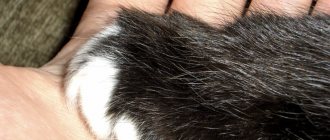What causes sudden aggression in cats? Why does a cat attack its owner for no apparent reason? What could be the prerequisites and what should be done in this case? In the article, we talked about breeds prone to aggression and considered options for response.
Usually a gentle and affectionate domestic cat, the family favorite with a loud purr and soft paws sometimes turns into a hissing, scratching monster in a second. Owners are often faced with such dramatic changes in the behavior of their beloved pets and do not know what they should do. Let's try to figure out what causes unexpected changes and what to do about it.
What to do about cat aggression
Which breeds are the most aggressive?
There are breeds for which rapid mood changes are quite typical. Such cases cannot be called unexpected aggression, since when getting an animal of a particular breed, a responsible owner must study its characteristics. What breeds are we talking about?
- Siamese cat.
An ancient breed, its history is determined by the difficult character of the Siamese representatives. There is a legend according to which in ancient Thailand Siamese cats protected homes and were “guard cats.” Because of this, the idea of \u200b\u200bthe aggression of the Siamese is firmly rooted in the minds of people. But in practice, these blue-eyed cats become strongly attached to their owners, and can show aggression towards strangers if they encroach on what the cats think belongs to them. Beloved owners fall into the property category. Provided the Siamese cat is properly raised and given attention, he will not rush at his owner without reason.
Siamese cat
- British shorthair cat.
Britons are by nature very independent and self-sufficient. If they are not inclined to communicate, and they are forced into contact, they may attack. Due to their often strong build, such attacks can result in painful injuries.
- Bengal cat.
Hybrid of wild and domestic cat. Bengals are always happy to hunt: for a toy or human hands. It is important to accustom a kitten to handling from an early age, then an adult pet will be able to dispel the myth about the bloodthirstiness and uncontrollability of its breed.
- White cats.
Cats with white coats, including Turkish Angoras, are often deaf in one ear or completely deaf from birth. The relationship between a genetic predisposition to hearing impairment and white coat color has been well studied; it was noted by Charles Darwin. However, white cats can often feel unsafe because they cannot hear a threat coming from behind. It is these qualities that explain the tendency to aggression.
In general, I would like to add that the opinion that all individuals of the same breed are identical is akin to racial prejudice. All animals are unique, they have their own conditions for growing up and developing character. And if you once got hurt by a barn cat, you may have pulled its tail too hard. When any kitten grows up in an atmosphere of love and respect, when it receives enough attention and care, it simply does not have a chance to grow up to be an unbridled aggressor who keeps all household members in fear.
White cats may be prone to attacks due to deafness
Options for how to wean
You can stop your cat from biting. It is important to adhere to a certain line of behavior.
Wean the kitten
Kittens, like children, need to be raised. And the sooner this process begins, the more effective it will be. It is more difficult to retrain an adult animal than a baby. If the kitten bites hard, you need to stop playing and clearly, loudly say “No” and stop interacting with it, ignore it for a while. You can hiss at him after a bite.
Another option is possible - to switch attention to something else, for example, a toy, but you cannot give a treat. Otherwise, he will take this as praise and will continue to behave aggressively towards people.
The easiest way to stop biting is at an early age.
Wean an adult cat
When the cat is already an adult, you can use several techniques that will help rid your pet of the habit of biting. These methods include:
- Proper communication between cat and guests. A cat should not perceive people as aggressors, so it is worth teaching him to communicate from a young age. It is also important that those who come behave with respect for the pet: do not pick him up if he doesn’t like it, don’t throw him up (he may get scared) and don’t bother him too much. If an animal has huddled in a corner in front of guests, there is no need to pull it out of its shelter to show off to your friends.
- The cat should have toys with which he can have fun, but you should not play with your hands.
The cat must have toys for “biting”
- When a cat bites, you need to make a sharp sound and he will let go, as it is unpleasant for him. You can clap your hands or shout sharply.
- If aggression in the form of biting occurs frequently, and all obvious reasons for this behavior have been excluded, you should visit a veterinarian; the problem may be that your pet is sick.
- You can show the cat that bites are unpleasant for the owner. Try ignoring requests for a treat or more play.
- If bites are very frequent, then you can prepare a container with a spray bottle and spray it on the cat in case of aggression. He will get scared and run away. This will wean him from such behavior.
- Among other things, it is necessary to regularly vaccinate against rabies. Your pet can become infected with this incurable disease and become dangerous to others. Therefore, you should not neglect regular visits to the veterinary clinic.
Main reasons for attacks
So, we found out that the cat rushes at its owners not because it has a “bad breed,” what to do next. First you need to find out the reasons and exclude possible diseases.
Miseducation
When a kitten appears in the house, it becomes the object of everyone's attention and a source of boundless joy. Plays with all movable objects, suddenly attacks immovable ones during his childhood games. It is important to track the moment and not develop the habit of the animal throwing itself at the feet of passing owners and not making its hands the only toy. The cat will grow up, baby teeth will be replaced by strong teeth, claws will become larger in size, as will the animal itself, which will gain weight and strength. Then playing with your hand will bring joy to only one side.
When a kitten appears, make sure that you provide him with leisure time, buy toys, and perhaps a house in which he can jump and climb. Then the focus will shift, the animal will still be happy, and you will be safe.
By allowing the kitten to scratch itself, the owner encourages incorrect behavior
Breed characteristics
To avoid having to lament what an evil cat you got, study the characteristics of the breed and talk to the breeder. If there are prerequisites, pay special attention to the kitten in the first months of its life. Get used to holding, stroking and caressing your baby. If there are noticeable preconditions for aggression, punish. But don’t hit, this will cause retaliatory aggression, immediate or hidden.
Separation from mom
The formation of normal social behavior begins in childhood. When a baby is left early by his mother, he is automatically deprived of a basic sense of security and is left to his own devices. This is the main reason why a kitten bites and lunges at its owner for no apparent reason. Being a loner, a kitten must be constantly ready to defend itself. Such an animal, showing aggression in adulthood, seeks security for itself. In this case, you must be patient and show him for a long time with your behavior that he has nothing to fear, and now you will protect him if something happens.
Often the reason for a cat's aggression lies in its childhood.
Other Possible Causes
At least nine other reasons can be identified:
- Some kittens, for one reason or another, are isolated from their brothers and sisters, and as a result, their social behavior is not formed in the correct way. Then a tendency to react incorrectly to other animals, including aggression, may develop.
- It happens that owners do not understand the needs of the cat. For example, a cat that scratches and bites is taken with them to the dacha, it has space for life and games, as well as the opportunity for secluded tranquility, and everything falls into place, there is no trace of aggression left.
- Aggression caused by fear is in turn divided into four degrees according to the degree of complexity: mild, moderate, severe and very severe degree of fear. The first is typical for meeting a new animal, person or home: the cat warily studies the object. During the second stage, the tail curls up, the whole body tenses, and the mood seems very restrained. Can be observed during a visit to the doctor. The severe stage is characterized by a quick reaction, not always adequate, to what is happening: the animal defends itself with teeth and claws. Saves, for example, during a dog attack. A very severe stage is dangerous not so much for the person as for the cat itself. Involuntary urination may occur, the pupils dilate, at this moment a maximum dose of adrenaline is present in the blood, and the heart rate goes off scale. In this case, you need to cover the cat, for example, with a box, and leave it alone for a while.
When defending their territory, cats often attack people.
- Fighting within one species can take place not only when a newcomer appears in the house, but can also be activated when the animals live happily together.
- Cats suffering from loneliness can also become unfriendly. In nature, cats always have something to do. Make sure that your pet has the opportunity to release energy on his own if you cannot participate in this. There are breeds that simply need company, such as Orientals. If you don't have the opportunity to spend time with a charming cat, give him company in the form of a second cat or dog.
- Sometimes, on the contrary, anger becomes a reaction to a large crowd of people. There are known cases of heart attacks in cats whose house was visited by “uninvited guests.” Confusion in the face of insecurity on one's own territory can cause anger, and as a result, an attack.
- The need to fight for territory with other animals, and sometimes people, is a common reason for aggression. A new pet appears in the house, an unfamiliar cat walks outside the apartment door or under the window, or even a small child uses a bed for a needle - all this can cause an unexpected reaction.
Playing with foreign objects develops good habits
- When playing with a cat, you can cause an aggressive reaction without noticing it. We are talking about cases when the animal “plays”, and the fun smoothly flows into fighting. In this case, cats usually give a warning by meowing before throwing. Do not continue the game, calmly and smoothly move away from the animal, give it time to calm down.
- Finally, if an adult cat suddenly begins to attack its owners, the cause may be physical illness. Try to track the beginning of aggressive behavior. If after eating the pet does not show pleasure, does not lick itself, but begins to wag its tail and express anxiety, the cause may be poor-quality food or problems with the gastrointestinal tract.
Aggression may indicate the manifestation of an invisible disease, such as toxoplasmosis, hepatoencephalopathy, ischemic encephalopathy, meningioma, chemical poisoning, epilepsy. Inexplicable anger can be caused by injuries or hormonal imbalance.
In case of repeated unexplained attacks of aggression, take the cat to the veterinarian - the cause may be a disease that can only be diagnosed by a specialist.
A well-behaved kitten will never harm a child
Teething
If the owner is bitten by a kitten, then most often the reason for this behavior is teething. In such situations, the baby constantly tries to put something in his mouth, which is quite normal for this age. To prevent a kitten from growing into a naughty prankster, it is important to explain from an early age that this cannot be done.
To help your cat cut teeth faster and stop biting, it is recommended to buy a special rubber toy that your pet can chew on when he wants to “scratch” his gums.
The owner's actions in response to aggression
If we are talking about a kitten that is excessively active during play, it is recommended to play with the baby more often with a toy with a string on a stick. This way he will be able to waste excess energy, after which he can be caressed and stroked. You need to make it clear to the small pet that you do not allow him to attack you; to do this, you can firmly grab him by the withers for a while, showing that you are in charge here. Experienced owners also suggest a method of calming with a spray bottle. Splashes of water cool the ardor.
When it comes to an adult with suddenly enlarged pupils, waving its tail and frozen in a hunter's pose, the first thing you need to do is remain calm. Do not make sudden movements and under no circumstances attempt to use physical force. Slowly move away to a safe distance, try to distract the animal with a toy. The spray bottle method can also help, keeping the cat switched and occupied for at least a while. As punishment, it is enough to leave the animal alone for at least an hour.
Punish the animal
Remember that in all cases violence begets violence. Punishment, whether verbal or physical, will cause repeated aggression
Never hit a cat!
As punishment, grab the cat by the scruff of the neck, this is a gesture of behavioral superiority. Take the animal out of the room and leave it alone for a while. It is possible to retrain a pet at any age, but the older it is, the more work and patience will be required from you.
Punishment will only cause retaliatory aggression
Engage in education
Raising a cat doesn't end when it's no longer a kitten. Just as you can spoil an animal at any age, you can also instill in it good habits. It is important that your pet understands that you are not equal to him, and that you are in charge here. In parenting, you should not succumb to provocations: if you decide to teach your cat a lesson by being alone, plaintive meows should not make you change your intentions.
Caress treatment
Not the safest, but effective way to combat aggressive behavior is treatment with affection. Noticing that the cat's mood is changing, arching its back, flattening its ears, waving its tail from side to side, caress it with all the tenderness that you have. The aggressor will have no one to fight with and nothing to fight for. The animal will feel safe and calm.
Readiness to attack - how to recognize
Cats don't bite without warning. They always give a person a chance to change his behavior. Signs that indicate an imminent attack are as follows:
- the animal's posture changes;
- the cat's body tenses;
- the purring stops;
- ears flatten;
- the pupils dilate, anger appears in the gaze;
- the sounds the cat makes become threatening;
- the expression on the face becomes angry;
- tail twitches.
A cat that is ready to attack changes its behavior
Such signs indicate an aggressive mood of the pet, that he has begun to get angry. You should not ignore them, but it is better to leave the cat alone for a while so that he calms down.
What else do veterinarians advise?
Sterilization is often the only way to avoid cat temperament. A safe operation changes the animal’s hormonal background, making it more balanced, sometimes even more affectionate.
If you are faced with the problem of unexplained outbursts of aggression in your pet, you should remember that everything happens for a reason. We need to figure out what is bothering the cat, why it needs to protect itself and from whom. The first symptoms of anger will help relieve your calmness, love and care in all forms. At the slightest suspicion of a health threat, ensure that your pet visits a specialist.
Boredom
Often an adult cat bites its owner simply because it is bored. The animal wants to attract attention, so it first begins to lick, and if the owner does not react, then bite. In order for your pet to stop behaving this way, it is recommended to spend more time with him, playing, talking, or just sitting together in front of the TV.
Cats perfectly understand the mood of the owner, and just like people, they require communication and attention. You should not scold or punish an animal when, after a long separation, it begins to lick and bite. In such situations, it is important to communicate with your four-legged friend so that he understands how dear and loved he is in the family.
Stress
If the cat is frightened by something or is stressed due to recent unpleasant events, its behavior may be inappropriate. Nervous tension in such situations results in different ways. Some refuse to eat, others hide in a secluded place, and others begin to bite their owners, showing by this behavior that they are uncomfortable.
In such situations, it is first of all important to reduce the stress factor to a minimum. The animal should feel constant support, understanding, love. If the cat is clearly worried, owners are advised to communicate with him more often, play, and walk. As soon as the pet recovers from stress, its behavior will return to the same as before. You just need to wait out this period and do everything to make your four-legged friend feel safe.
Hunger, thirst
When a cat is hungry, it becomes irritated, and if a person ignores a request to feed, don’t be surprised that the animal begins to behave just as carelessly towards him. It is important to feed your four-legged friends with quality food on time.
Irritation can also be associated with thirst. Therefore, pets should always have fresh, clean water at their disposal.
Sexual hunting
Puberty in cats of popular breeds occurs at the age of 6–9 months. Hormonal surges sometimes make the animal unrecognizable. The cat yells all day, doesn’t sleep, marks its territory, and becomes aggressive. The cat does not leave a single step from the owner, constantly rubs against the legs, caresses due to overexcitation, and bites.
If the owner does not plan to breed offspring, then the only option to save the animal from such torment is castration or sterilization. Some owners are hesitant to resort to such drastic measures. Then veterinarians advise giving the pet a separate room during the period of heat, where no one will disturb him or get on his nerves.











